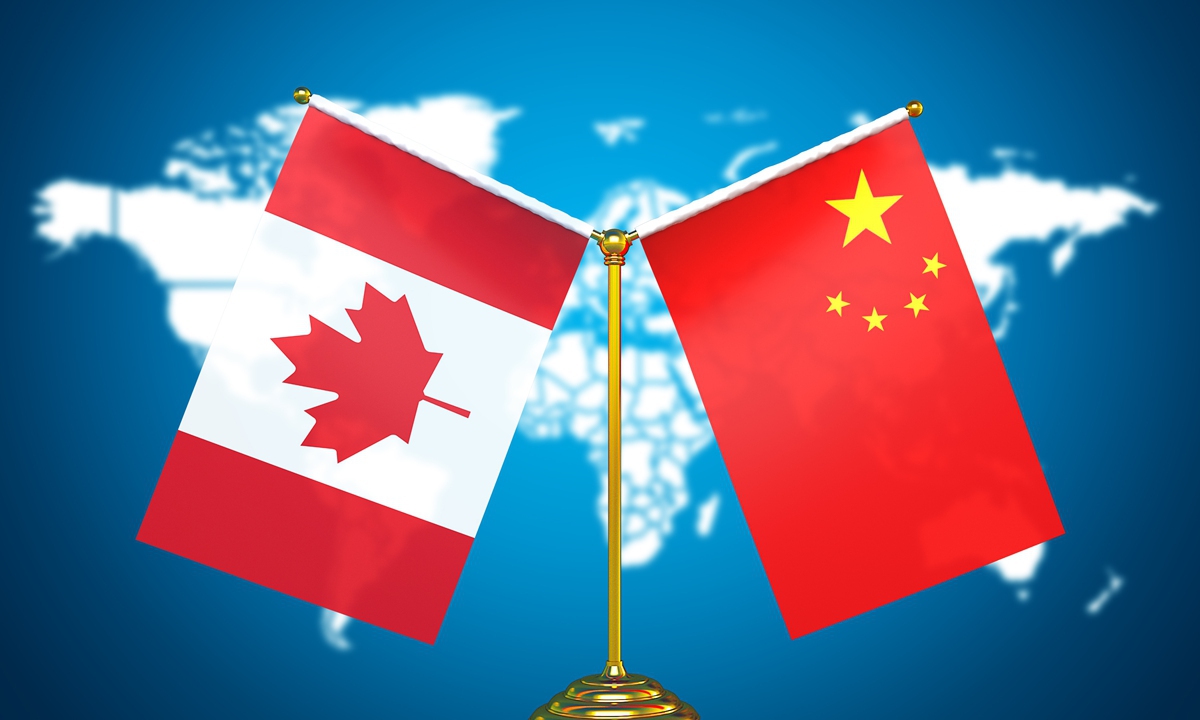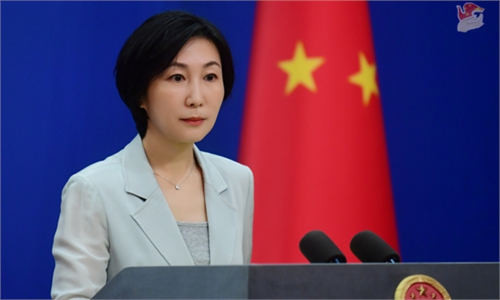As many in the West shift to pragmatism, Canada's hostility toward China absurd, dangerous

China and Canada Photo: VCG
Over the past week or so, the world, which had been mired in escalating geopolitical tensions that seriously threatened global peace and development, saw some much-needed relief. At the recently concluded G20 summit in Bali, Indonesia and then the APEC leaders' meeting in Bangkok, Thailand, many world leaders sat down face-to-face for the first time since the start of the COVID-19 pandemic and talked about how to better develop bilateral relations and jointly tackle global issues. Among the dozens of bilateral meetings took place at the two occasions, those between many Western leaders, including the US, French and UK leaders, with the Chinese leader were especially encouraging for many who had been worried about tensions.Some pessimists argue that such closely watched meetings were mostly for the cameras and that differences and even rivalry among major powers will remain. And to a certain degree, they may very well be right. After all, the already flaring tensions and the deep-rooted zero-sum mindset of many Western politicians regarding China's inevitable rise will not disappear suddenly. No one would expect one meeting or even a series of meetings would resolve all the thorny differences and bring us back to business as usual. In fact, "vigorous" competition, as US President Joe Biden put it, between China and the US will remain for the foreseeable future and may very well further intensify.
So erasing all the differences and ending such a competition was clearly not the point. As officials from different sides repeatedly made it clear, the meetings were focused on how to manage those differences so that the competition won't plunge into disastrous conflicts. From that perspective, what's coming out of the meetings has been very constructive and encouraging. The overarching theme was that Western countries, which were previously engaged in dangerous geopolitical brinkmanship, have realized the grave danger and the mounting damages of it, and are seeking to maintain a degree of pragmatism in relations with China.
However, having said all that, there was one exception. Canada appeared to be on a different path - a dangerous path. Justin Trudeau, its prime minister, was very much focused on the theatrics at the G20 and parroted the types of rhetoric regarding China that we usually see coming out of Washington, even as many of his Western colleagues were engaged in constructive dialogue with China and sought to focus on pragmatic cooperation with China.
Australia, for example, which had been the most vocal and active supporter of the US' containment strategy against China in recent years, is seeking to improve ties with China in an apparent attempt to reduce damages on bilateral trade. And after a meeting between the Chinese and Australian leaders in Bali last week, initial signs point to a very positive picture, with many Australian businesses reportedly overwhelmingly welcoming the development in bilateral ties.
But Canada on the other hand has recently adopted an increasingly hostile approach toward China through a series of moves. Canadian politicians and media outlets have been endlessly hyping unfounded claims of "Chinese interference" into Canadian elections, even though the country's chief electoral officer has said that he has not received any such report.
Canadian police have also arrested a worker at Hydro-Quebec, a public utility company in Canada, alleging that the worker had "obtained trade secrets to benefit the People's Republic of China, to the detriment of Canada's economic interests." And just this week, Canadian police said they were investigating reports of Chinese "police service stations" operating in Toronto, according to Reuters.
In addition, Canada has been hyping up an upcoming so-called Indo-Pacific strategy, which is widely expected to be echoing the US' strategy with the same name that targets China. Canadian officials, in an apparent attempt to attract US investment into its mining sector, have publicly supported the US' push for a so-called economic decoupling from China. It has actually ordered Chinese firms to divest their investments in Canadian companies.
All of these sinister stunts - the unfounded claims of election interference, the clearly politically motivated charge of spying, the discrimination against Chinese firms and the call for an economic decoupling - are straight out of the US' playbook that drove bilateral relations into the lowest points in decades. More accurately, such are the tricks pulled by former US president Donald Trump's administration, who picked the trade fight with China. So Canada did not even come up with anything original even if it actively tries to pick a fight with China. And that is the question: Is Canada trying to pick up a fight with China?
Regardless of the answer, Canada's move is truly puzzling, especially given the fact that many Western countries, including the US, are seeking to at least lower tension with China to avoid conflicts and even seek pragmatic cooperation with China in areas of shared interests. And that brings up another factor that makes Canada's hostility toward China even more absurd. There are no fundamental conflicting interests between China and Canada - no territorial disputes and no historical grievances. In fact, bilateral relations in a wide range of areas from people-to-people exchanges to trade had been very close and greatly beneficial for both sides over the past several decades until Washington picked a fight against China.
So where does all this hostility come from? What's the end game for Canadian politicians and media outlets who are relentlessly hyping up such hostility? For staying power or seizing power in domestic politics? How does that help Canada? Maybe Canadian officials are in an alternate universe, because in this world, no sensible person with full knowledge of the mutually beneficial nature of China-Canada ties would understand it.
And this is not the first time Canadian authorities have taken such extremely strange moves. They arrested Chinese executive Meng Wanzhou a few years ago at the behest of the US, which seriously undermined bilateral ties. Meng's release last year offered a great opportunity for Canada to repair ties with China, but obviously that did not happen and things have only gone worse. So one has to question the ability of Canadian leaders in grasping the rapidly shifting global geo-economic landscape and coming up with sound strategies that are in the vital interests of Canada if not the world as a whole.
But here is something undisputable. Whatever geopolitical brinkmanship Canadian officials are pulling, it will not work on China. Canadian officials, if they follow the US' economic and trade wars against China, should know this. What's also clear is that with such hostile moves, Canada is playing a dangerous game it cannot afford to lose.
The author is an editor with the Global Times. bizopinion@globaltimes.com.cn



